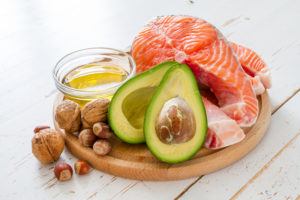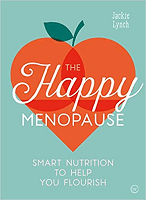
What is the one dietary change that can relieve my menopause symptoms?
That’s a question I’m often asked and unfortunately there is no single silver bullet nutrient that can tackle the multitude of symptoms triggered by the decline in sex hormones as we approach the menopause. All the nutrients which are essential for our health and wellbeing in midlife work in synergy with each other and simply aren’t as effective in isolation, so a balanced diet with a broad range of different foods is definitely the best approach.
But you could try to recreate that silver bullet effect by focusing on these 4 areas as a first step, because collectively, they could make a huge difference to the way that you feel.
Eat protein with every meal and snack
Protein plays multiple roles in the body, supporting strong bones and improving muscle tone. Women lose up to 40% of muscle mass around the menopause and low bone density is a big concern for women in midlife and beyond. It also helps to improve strength and stamina. The body converts amino acids, which are the bui
Add a spoon of ground flaxseed to your cereal or smoothie
Flaxseed is packed with protein and fibre which will help to support blood sugar balance, setting you up for a great start to the day. It’s an excellent source of omega 3 fatty acids, which support hormone and heart health, underpin effective functioning of the nervous system and help to keep our skin smooth and supple. Flaxseed has the added benefit of being rich in phytoestrogens, plant compounds which mimic the action of oestrogen in the body and which may help to relieve hot flushes.
Have 2 handfuls of leafy green vegetables every day
Leafy greens like spinach, kale, cabbage or watercress are a real powerhouse of menopause-friendly nutrients. They’re packed with calcium, containing twice as much per 100g as milk and are also an excellent source of magnesium. We need magnesium to support the absorption of calcium
Drink more water
Fatigue, headaches, dry skin, brain fog, confusion, poor memory, loss of concentration and constipation are all typical symptoms of the menopause. But they’re also classic signs of dehydration, so before you blame your hormones, ask yourself if you’re drinking enough water. Just 2% dehydration can significantly affect cognitive function, so it doesn’t take much to make quite a difference to how you feel. Everyone is different and the right amount of fluid for you will depend on your height, build, level of physical activity and the temperature of your environment, but for most of us it’s probably about 1.5-2L per day of water, squash or herbal teas. Bear in mind that fruit and vegetables are also full of water, if you’re not keen on drinking large amounts of fluid. The best way to check if you’re dehydrated is to keep an eye on the colour of your urine. It should be a pale straw colour most of the time (not completely clear, which may indicate overhydration). If it’s consistently darker than that, then you’re probably dehydrated and need to increase your fluid intake. There are several good hydration apps that can help you keep on track, if you find it hard to remember to drink.
Jackie Lynch is a Registered Nutritional Therapist, founder
www.well-well-well.co.uk. @WellWellWellUK.




